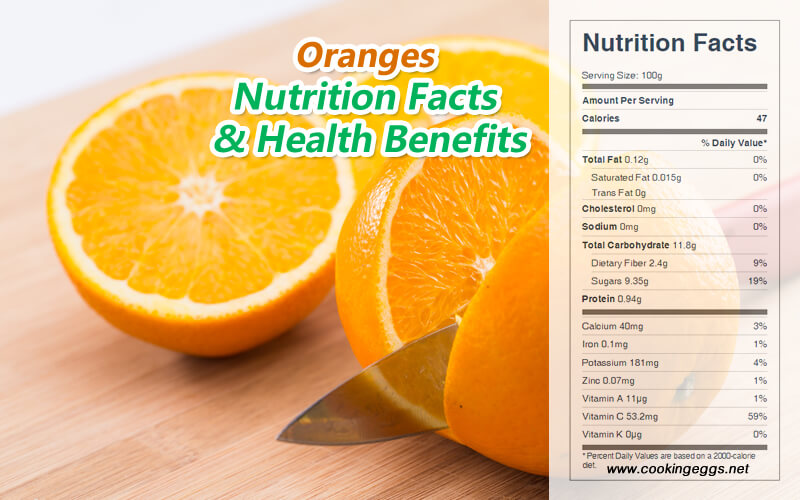Oranges Nutrition Facts & Health Benefits
Oranges originated in Asia thousands of years ago and have become one of the most popular fruits the world over. The high vitamin C content of fresh oranges accounts for much of their beneficial influence on our health, given the vital importance of this vitamin in combating infection.
Nutritional Value of Orange
Orange flesh is 87% water, 12% carbohydrates, 1% protein, and contains negligible fat. As a 100 gram reference amount, orange flesh provides 47 calories and is a rich source of vitamin C, providing 64% of the daily value. No other micronutrients are present in significant amounts.
Oranges contain diverse phytochemicals, including carotenoids (beta-carotene, lutein, and beta-cryptoxanthin), flavonoids (e.g. naringenin), and numerous volatile organic compounds that produce orange aroma, including aldehydes, esters, terpenes, alcohols, and ketones.
One raw navel orange provides 60 calories, 15.2 g carbohydrate, 1.3 g protein, 0.1 g fat, 3.1 g dietary fiber, 240 IU vitamin A, 75 mg vitamin C, 44 mcg folic acid, 1 mg sodium, 233 mg potassium, 52 mg calcium, 25 mg phosphorus, 13 mg magnesium, and 0.16 mg iron.

Raw Oranges Nutrition Facts Label
Health Benefits of Oranges
There are various potent components in whole oranges that make them star performers in the fight against aging and disease. The discoveries that are being made about the power of oranges to support heart health and prevent cancer, stroke, diabetes, and a host of chronic ailments should bring oranges and other citrus fruits back to center stage as crucial components in a healthy diet.
Oranges and their juice are almost everybody’s favorite source of vitamin C, a vitamin whose many benefits have been known for so long that we sometimes overlook them. Vitamin C is the main antioxidant found in citrus fruits, but there is so much more to oranges than just immune-boosting properties. It can also promote iron absorption and is important for wound healing and heart health.
Citrus fruit contains a significant source of flavanone, hesperidin, and naringin. Hesperidin is known for its anti-inflammatory, antioxidant, immunomodulatory, cholesterol-lowering, and anticancer effects. It works to revive vitamin C after it has quenched a free radical. In other words, hesperidin strengthens and amplifies the effect of vitamin C in your body. In an interesting human clinical trial, orange juice was shown to elevate HDL cholesterol (good cholesterol) while lowering LDL (bad cholesterol).
Flavonoids are a class of polyphenols found in fruits, vegetables, legumes, nuts, seeds, grains, tea, and wine. Citrus flavonoids, which are found in the fruit’s tissue, juice, pulp, and skin, are one of the reasons for the health-promoting attributes of citrus fruits and the reason that the whole fruit is so much more healthy than just the juice. Two of the flavonoids in citrus—naringin in grapefruit and hesperidin in orange—occur only rarely in other plants and are thus essentially unique to citrus.
The power of citrus flavonoids is dazzling. They’re antioxidants and antimutagenic. The latter refers to their ability to prevent cells from mutating and initiating one of the first steps in the development of cancer and other chronic diseases. This is accomplished by their apparent ability to absorb ultraviolet light, protect DNA, and interact with carcinogens. Citrus flavonoids have been shown to inhibit cancer cell growth, strengthen capillaries, act as anti-inflammatories, and they are antiallergenic and antimicrobial. Flavonoid intake is inversely associated with the incidence of heart attack and stroke, as well as a host of other ailments.
Furthermore, the flavonoids in oranges reduced the most common inflammatory marker, C-Reactive Protein (CRP), by about 60%, indicating an anti-inflammatory effect. Last, when they considered antioxidant action, they found an enhanced overall antioxidant capacity after consumption.
The fiber and pectin in oranges are another major contributor to heart health. Citrus fruits are one of the richest sources of high-quality pectin. It is a type of dietary fiber. Pectin is a major component of the kind of fiber that is known to lower cholesterol. Pectin is also helpful in stabilizing blood sugar. A single orange provides 3 grams of fiber, and dietary fiber has been associated with a wide range of health benefits. Pectin is present in large amounts in the white lining of citrus fruits. An easy way to increase your pectin intake is to eat the white pith. Approximately 35% of Americans only consume fruit juice. In most cases, their health would benefit if they added whole fruit whenever possible.
Oranges also help prevent cardiovascular disease by supplying folate when used in supplementary form. Folate is one of the B vitamins. The total folic acid content in the average diet has been found to be below the recommended daily allowances, and mild-to-moderate folate deficiency is common. In fact, folate deficiency is known to be among the most common vitamin deficiencies in the world. We know that dietary folate can play an important role in the prevention of cardiovascular disease; it is essential for the maintenance of normal DNA and also plays a role in the prevention of colon and cervical cancers, and possibly even breast cancer.
In the oil of the peel of citrus fruits is a phytonutrient known as limonene. Oranges, mandarins, lemons, and limes contain significant amounts of limonene in the peel and smaller quantities in the pulp. Limonene stimulates our antioxidant detoxification enzyme system, thus helping to stop cancer before it can even begin. Limonene also reduces the activity of proteins that can trigger abnormal cell growth.
Oranges also provide significant potassium and are a good source of calcium and magnesium (three minerals good for regulating blood pressure), as well as phosphorus and the vitamin A precursor beta-carotene.